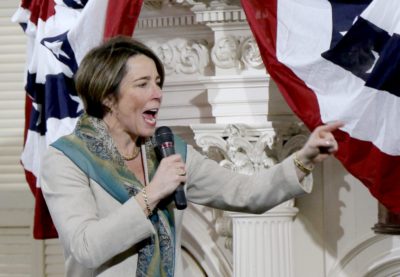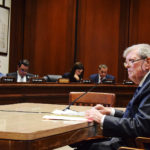
Massachusetts Attorney General Maura Healey plans to sue President Donald Trump’s administration over the withdrawal of an act meant to limit greenhouse gases.
Environmental Protection Agency administrator Scott Pruitt announced Tuesday the withdrawal of the Clean Power Plan, an Obama-era regulation, according to a press release from the EPA.
The withdrawal follows a review of the plan that was authorized under the Energy Independence Executive Order Trump signed earlier this year in an effort to protect jobs, according to a press release from the EPA in March.
Healey tweeted Wednesday she was suing the Trump administration, “the climate change deniers,” because they are attempting to reverse the progress the nation has established.
“This is illegal and, like President Trump’s decision to withdraw from the Paris Agreement, imperils the future of our planet,” Healey tweeted.
Echoing Healey, the Climate Mayors network, of which Boston Mayor Martin Walsh is the co-chair, said in a statement Tuesday this order “undermines our nation’s leadership on climate action and threatens Americans’ health and safety.”
Without protections on greenhouse gases like the Clean Power Act, it creates a chain reaction which affects the entire chain of life, Robyn Hannigan, the dean of the School of Environment at the University of Massachusetts Boston, said.
“When we look at human impacts … the rate at which we’re increasing [CO2 emissions] in the atmosphere is significantly greater than what we’ve seen in the past,” Hannigan said.
Hannigan said what Healey is doing is important because it exposes logical fallacies in the executive order and promotes conversation about the energy sector in general.
Matthias Ruth, the director of the School of Public Policy and Urban Affairs at Northeastern University, said Trump’s order takes the United States a few steps back in terms of the progression of cutting emissions through technology improvements.
“If we take away the incentives to improve power plants here in the nation … then we will have technology that’s pretty much outdated,” Ruth said. “We’re losing a wonderful business opportunity.”
Ruth said Healey’s potential lawsuit shows the Commonwealth isn’t backing down from its position on climate change.
“[The lawsuit] does send a really important signal that we’re not just going to roll over and take it as it comes,” Ruth said.
Several Boston residents said the effect greenhouse gases have on climate change is evident, but are divided on whether Healey’s lawsuit will be effective.
Garrett Gould, 26, of East Boston, said he understands the importance of regulations on an industry. With Trump’s new executive order calling for deregulation, many industries will get away with potentially harmful activities to the environment in the long run, Gould said.
“I work in a field where it isn’t the most efficient industry,” Gould said. “Construction and museums, they waste a lot of stuff and a lot of stuff gets turned over really rapidly. There needs to be more regulations on how we use certain building materials and products and where those things come from and how they’re processed.”
Stefan Bieri, 48, of Back Bay, said while Trump thinks he is saving jobs, it will only affect higher-ups, like CEOs, while climate change affects everyone.
“Climate change certainly affects us all, affects us in this neighborhood because we’re a low-lying neighborhood close to the water,” Bieri said. “Power generation affects us because wind transports whatever pollution there is out there and even if the plants are not located in Massachusetts, we’re prevalently downwind on the Western wind pattern which means we’re getting all the Midwestern and upper Midwestern power plant air over here.”
Joel Diaz, 22, of Dorchester, said climate change is evident now; however, he doesn’t think Healey’s lawsuit will go very far.
“I don’t think it should be 80 degrees in Boston in October,” Diaz said. “I don’t think [the lawsuit will be effective] because … there is a guy who was trying to investigate [Trump] and he got fired.”













